Basic approach to materiality
In 2024, guided by our mission of “creating partnerships that change the world,” we identified six key material issues essential for achieving a sustainable society and enhancing corporate value. By addressing these priorities and meeting the associated goals, we are committed to contributing to the creation of a sustainable future.
Strike’s materiality
| Strike’s materiality | Description | Relevant SDGs |
|---|---|---|
| Contributing to a decarbonized society | We will contribute to the realization of a decarbonized society by reducing greenhouse gas emissions in our business and supporting our customers in transitioning to new business models. | 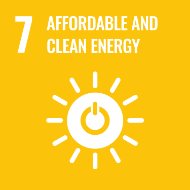  |
| Providing reliable, customer-focused M&A brokerage services across the industry | In delivering M&A brokerage services, our goal is to not only enhance our clients’ corporate value but also to build strong trust by providing accurate information and responding quickly to their needs. Additionally, we are committed to promoting fair, transparent, and responsible business practices across the entire industry. | 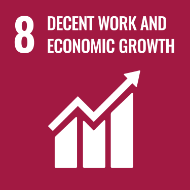 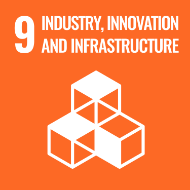  |
| Contributing to regional economic development through the promotion of M&A | By facilitating optimal M&A across all regions of Japan, including rural areas, we will promote the revitalization of local economies by ensuring the continuation of essential businesses and increasing the corporate value of our clients. |   |
| Resolving local issues through social contribution activities | Contribute to local communities by addressing various challenges through social contribution activities, such as stimulating tourism and exchange, supporting the preservation and transmission of local culture, and actively participating in local initiatives. |  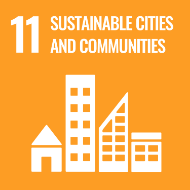 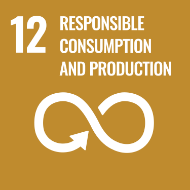 |
| Creating a workplace that unlocks the potential of diverse talent | Respect diversity in terms of gender, age, race, nationality, disability, religion, and values, and create an organization and culture that maximizes each individual’s potential by recognizing, nurturing, and utilizing their unique qualities. | 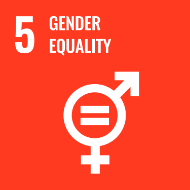  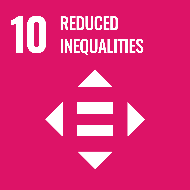 |
| Ensuring compliance and data security | To ensure that our corporate activities align not only with laws and regulations but also with ethics and social norms, we will implement measures to prevent compliance violations and rigorously manage important information, including customer data. |  |
Materiality identification process
The following steps were taken to identify material issues:
We identified social issues in the ESG area by referencing GRI, SASB, SDGs, and other international guidelines, along with evaluation criteria from sustainability rating organizations. In addition, taking into account industry-specific issues and our company’s unique circumstances, we identified additional social issues that we should address, resulting in a total list of 51 items.
The 51 social issues identified in Step 1 were comprehensively evaluated from two perspectives: "importance to stakeholders" and "importance to Strike." These issues were then organized into a materiality map, narrowing the list down to 12 high-priority social issues.
The 12 social issues identified in Step 2 were organized into six material issues based on the relevance of the initiatives. We confirmed the appropriateness of the six material issues through a series of exchanges of opinions with external experts and internal discussions.
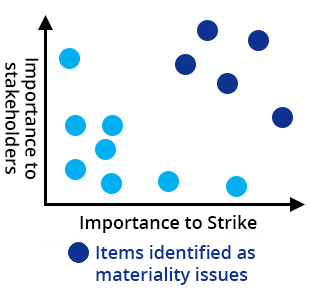
Through the above steps, six material issues were identified as key areas for the Company to address and were subsequently approved by the Board of Directors. We will revise the identified material issues as necessary, in line with the progress of our initiatives and changes in the social and business environment.
KPIs and targets
The KPIs and specific targets for achieving each material issue are as follows:
| Materiality | KPI | Target |
|---|---|---|
| Contributing to a decarbonized society | GHG emissions (Scope 1+2) reduction rate | 50% reduction by FY2030/9 from the base year (FY2022/9) |
| Number of M&A transactions closed related to decarbonization and low-carbon businesses | At least five in five years (FY2029/9) | |
| Providing reliable, customer-focused M&A brokerage services across the industry | Establish an organizational system based on policies in accordance with industry requirements | Compliance with M&A guidelines for SMEs and the self-regulatory rules of the M&A Advisors Association, along with staying responsive to the latest trends |
| Customer satisfaction level | Start of customer satisfaction survey (2025) | |
| Industry-wide efforts to improve service quality | Active participation in the M&A Advisors Association’s meetings and events, dissemination of opinions, and promotion of membership in the association | |
| Number of employee training sessions related to M&A service provision | All-hands training: At least twice a year (FY2025/9) | |
| Contributing to regional economic development through the promotion of M&A | Number of deals related to business succession and growth support (number of seller companies) | Number of deals exceeding that of the most recent fiscal year (FY2025/9) |
| Number of M&A transactions closed in specific sectors | Number of hospital/clinic deals closed: Cumulative total of 100 deals over five years (FY2029/9) | |
| Resolving local issues through social contribution activities | Clarification of basic policy and approach to social contribution activities | Establishment of policies for social contribution activities |
| Total amount of company resources allocated to social contribution activities | Engagement with local communities and the enhancement of educational and donation activities that contribute to addressing local issues and supporting their development | |
| Creating a workplace that unlocks the potential of diverse talent | Develop a personnel system, training programs, and other frameworks that promote the empowerment and engagement of human resources. | Revamp personnel and salary systems to promote both individual and team growth, provide training and educational opportunities to support employee development, and cultivate an organizational culture that encourages taking on challenges |
| Education and training costs per employee | 100,000 yen per employee or more per year (FY2025/9) | |
| Number and percentage of employees with qualifications in specific fields | Acquisition of Nissho Bookkeeping Level 2 or an equivalent qualification: 100% of consultants (Applicable persons: consultants who have been with the company for more than a year) *Equivalent qualifications: Certified Public Accountant, Certified Tax Accountant, U.S. Certified Public Accountant, Small and Medium Enterprise Management Consultant (FY2025/9) |
|
| Promotion of diversity and inclusion initiatives | Active recruitment of seniors, female consultants, people with disabilities, and multinational personnel | |
| Ratio of female managers | 10% (FY2026/9) | |
| Percentage of male employees taking parental leave | 100% (FY2025/9) | |
| Percentage of annual paid leave taken | 70% or more (FY2025/9) | |
| Ensuring compliance and data security | Reinforcement of compliance promotion systems (review of compliance-related regulations, implementation of compliance training) | Conduct periodic compliance training and review compliance-related regulations |
| Internal audits related to data security | Maintain a system that ensures proper auditing of the development and operational status of internal controls. | |
| Number of information management training and drills conducted | All-hands training or drills: At least twice a year (FY2025/9) |

